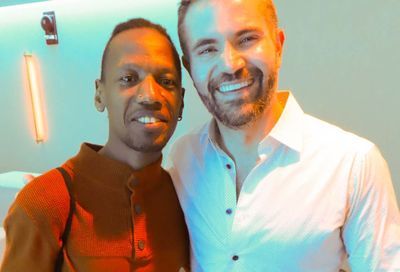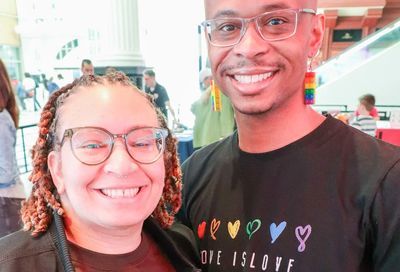HRC endorses 5 more Senate candidates and 40 House members
LGBTQ organization throws support behind Democrats ahead of November elections
By John Riley on May 18, 2020 @JRileyMW

The Human Rights Campaign rolled out a second wave of endorsements ahead of the November election, endorsing the bulk of the vulnerable House Democrats up for re-election this cycle, while also lending its support to five U.S. Senate candidates.
The nation’s largest LGBTQ rights organization threw its backing behind Sens. Mark Warner (D-Va.), Jeanne Shaheen (D-N.H.), and Dick Durbin (D-Ill.), as well as former North Carolina State Sen. Cal Cunningham, who is challenging Sen. Tom Tillis, and former Kansas State Sen. Barbara Bollier, a former moderate Republican who changed her party affiliation to independent and then Democratic, who is running for the open Senate seat being vacated by U.S. Sen. Pat Roberts.
Those endorsements come in addition to six others previously announced by HRC, which is seeking to shore up vulnerable Democrats like Sens. Gary Peters (D-Mich.), Tina Smith (D-Minn.), and Doug Jones (D-Ala.), as well as U.S. Rep. Ben Ray Lujan, a House member seeking an open Senate seat in New Mexico, Jamie Harrison, who is challenging Sen. Lindsey Grahm (R-S.C.), and Mark Kelly, who is challenging Sen. Martha McSally (R-Ariz.).
In the House, the 40 members who were endorsed included four openly gay House members who had previously not been endorsed by the organization — Reps. Sean Patrick Maloney (N.Y.), David Cicilline (R.I.), Mark Takano (Calif.) and Mark Pocan (Wis.) — as well as 36 of 42 members of the Democratic Congressional Campaign Committee’s “Frontline” Democrats.
“Frontline” Democrats, in DCCC speak, are those who are those considered most vulnerable, either due to President Trump’s relative popularity, or a strong Republican voting tradition, in their districts.
HRC previously threw its support six other “Frontline” Democrats — Reps. Lucy McBath (Ga.), Angie Craig (Minn.), Steven Horsford (Nevada), Susie Lee (Nevada), Lizzie Fletcher (Texas), and Colin Allred (Texas) — as well as a handful of Democratic challengers in Republican-held seats and the four-member Ohio Democratic congressional delegation, in its first round of endorsements.
Of the 42 endorsed by HRC, 35 are freshman members of Congress representing Districts that flipped from Republican to Democratic control in 2018. Four more are freshman members representing districts that remained in Democratic control but where Trump surged against Hillary Clinton in 2016, and three non-freshmen — Tom O’Halleran (Ariz.), Josh Gottheimer (N.J.), and Matt Cartwright (Pa.) — who have consistently been among the most vulnerable since their first elections to Congress.
Related: HRC launches $26 million campaign opposing “Trump-Pence regime”
One of the key factors influencing the decision to endorse was the acknowledgment that the successful passage of the Equality Act by the U.S. House of Representatives, which occurred one year and two days prior, only became possible due to the ability of the Democratic Party to seize control of the lower chamber through the successful victories of “Frontline” members.
HRC is hoping to assist Democrats in gaining control of the upper chamber in the upcoming November elections to ensure that pro-LGBTQ legislation, like the Equality Act, will not be blocked from passing in a future Congress by Senate Republicans. Indeed, Senate Majority Leader Mitch McConnell (R-Ky.) has proven to be the biggest obstacle to LGBTQ progress at the federal level for the better part of the last decade. McConnell has also successfully pushed through the confirmations of Trump nominees for federal judgeships, a significant number of whom have amassed decidedly anti-LGBTQ records over the course of their careers.
“In 2018, HRC stood with many of these pro-equality leaders to build a pro-equality majority in the U.S. House and pass the Equality Act. Within months of taking office, they did just that,” HRC President Alphonso David said in a statement. “Now HRC and these champions for equality must work together to ensure we maintain a pro-equality majority in the U.S. House and establish one in the U.S. Senate. Mitch McConnell’s refusal to allow consideration of the Equality Act leaves LGBTQ people across America at risk of being fired from jobs, refused essential services like health care, and more vulnerable to violence.”

Two years ago, HRC made significant financial investments to help register more than 32,000 voters as part of on-the-ground organizing efforts in several states with competitive midterm elections. Those efforts were intended to engage and mobilize the nearly 57 million “Equality Voters,” or those Americans whose vote is likely to be influenced by a candidate’s stance on LGBTQ rights, and ensuring they flock to the polls on Election Day.
This year, the organization will have 45 full-time staff in seven “priority” states, or those that will be the most fiercely contested at the presidential and congressional level, as well as 20 other staffers focusing on a second tier of states and districts.
“When we say our pledge of allegiance, we swear to fight for liberty and justice for all Americans,” Kansas Senate candidate Barbara Bollier said in a statement. “I take those words very seriously. I have been proud to be a vocal advocate for equality throughout my career as a doctor and as a Kansas legislator, and I am honored to have the support of the Human Rights Campaign. I promise to continue to be an advocate and a vocal ally for LGBTQ Americans, and to work to expand and protect their equal rights.”
“The story of North Carolina belongs to all the people of our state, regardless of who they love or who they are,” North Carolina Senate candidate Cunningham said in a statement. “The Human Rights Campaign gets that, which is why I am grateful for its support and impactful work. I look forward to working with HRC as we stand against discrimination and hate, and fight for the rights of all North Carolinians.”
“I will never back down from a fight for equality for all,” Rep. Katie Porter (D-Calif.), a freshman representing California’s conservative Orange County, said in a statement. “Discrimination is an attack on personal freedom and has no place in America. I will always stand with our LGBTQ community and show them respect and dignity, which we don’t always see from the Trump Administration. I am proud to be endorsed by the Human Rights Campaign and fully embrace its values.”

“It’s been almost a year since the House passed the Equality Act, but the Senate has refused to even vote on it,” Rep. Xochitl Torres Small (D-N.M.), another freshman who flipped a Republican-held seat two years ago, said in a statement. “As we work together to fight COVID-19 and its economic impact, LGBTQ people should not have to face discrimination in health care, housing, employment, and beyond. Now, just as always, no one should be discriminated against because of who they love. I am honored to have the Human Rights Campaign’s endorsement and remain committed to working with them to protect the rights of all.”
“Casting my vote for the Equality Act last year was one of the most moving moments of my first term in Congress,” Rep. Abby Finkenauer (D-Iowa), said in a statement. “I’m honored to have the endorsement of the Human Rights Campaign and to be part of the movement for equality and justice for all Americans.”
“I am proud to stand alongside the LGBTQ community and to continue the fight for their equality and protection under the law,” Rep. Max Rose (D-N.Y.) added. “This community adds to the cultural richness of Staten Island and South Brooklyn, and I will always follow them into battle, no matter what it takes.”
“As a pediatrician, I am keenly aware that the risks of depression, homelessness, and suicide are far higher in LGBTQ teens,” Rep. Kim Schrier (D-Wash.) said in a statement. “I have helped my patients navigate the difficulties of coming out as LGBTQ and am committed to fighting for a future where every child will feel wanted, welcomed, and treasured. I am a proud cosponsor of the Equality Act because it is critical that we expand our country’s civil rights protections to include the LGBTQ community.”
Read more:
Joe Biden calls conversion therapy “sick,” emphasizes importance of the Equality Act
6 in 10 LGBTI people in Europe are afraid to hold hands in public, survey says
Senate Democrats Shut Down Transgender Athlete Ban
The bill would have rewritten federal law to prohibit schools allowing transgender athletes to compete from receiving federal funds.
By John Riley on March 4, 2025 @JRileyMW
Democrats in the U.S. Senate blocked a Republican bill attempting to ban transgender athletes from women's and girl's sports at educational institutions.
The bill, S. 9, sought to rewrite Title IX of the Education Amendments of 1972, a federal law prohibiting sex-based discrimination in educational programs or activities, by explicitly stopping federal funds from going to institutions that allow transgender athletes to compete on female-designated competitive or elite sports teams.
The prohibition would not apply to co-ed or intramural sports leagues, nor does it prevent cisgender females from being allowed to try out for male-designated sports teams if their school does not offer that sport for females.
Disney Boldly Refuses to Cut Ties with HRC
Despite conservative pressure, Disney investors overwhelmingly rejected a proposal to stop participating in HRC's equality ratings survey.
By John Riley on March 23, 2025 @JRileyMW
The Walt Disney Company overwhelmingly rejected a proposal to cut ties with the Human Rights Campaign, the nation's largest LGBTQ advocacy organization.
The proposal, submitted to Disney's shareholders by the right-wing National Center for Public Policy Research's Free Enterprise Project, demanded that the company "cease" its participation in HRC's Corporate Equality Index (CEI).
The CEI rates companies on how LGBTQ-friendly or -affirming their employment or employee benefits policies are.
NCPPR's proposal argued that Disney's involvement with the CEI has alienated conservatives, hurting the company's brand by aligning itself with the LGBTQ community, having pro-LGBTQ workplace policies, and damaging the company's stock price.
Cincinnati Pride Cuts Ties With Several Corporate Sponsors
The LGBTQ organization wants to partner only with corporations that demonstrate regular support for the LGBTQ community and respect for DEI.
By John Riley on March 25, 2025 @JRileyMW
Cincinnati Pride announced it will cut ties with several corporate sponsors, sacrificing tens of thousands of dollars, in response to the companies' decisions to eliminate diversity, equity, and inclusion (DEI) policies and initiatives.
The organization acknowledged that it would be a struggle to replace the funding for its annual Pride parade. But it has also said it is essential to stand by its values, which include respect for the history and diverse culture of the LGBTQ community.
Cincinnati Pride says it doesn't want to work with corporate sponsors that are viewed as hostile to those values and would rather work with companies that have demonstrated a genuine, ongoing commitment to LGBTQ causes throughout the calendar year, according to Cincinnati NBC affiliate WLWT.
Support Metro Weekly’s Journalism
These are challenging times for news organizations. And yet it’s crucial we stay active and provide vital resources and information to both our local readers and the world. So won’t you please take a moment and consider supporting Metro Weekly with a membership? For as little as $5 a month, you can help ensure Metro Weekly magazine and MetroWeekly.com remain free, viable resources as we provide the best, most diverse, culturally-resonant LGBTQ coverage in both the D.C. region and around the world. Memberships come with exclusive perks and discounts, your own personal digital delivery of each week’s magazine (and an archive), access to our Member's Lounge when it launches this fall, and exclusive members-only items like Metro Weekly Membership Mugs and Tote Bags! Check out all our membership levels here and please join us today!
The Magazine
-
Most Popular
 Gay Army Reserve Officer in Uniform Sex Video Scandal
Gay Army Reserve Officer in Uniform Sex Video Scandal  Charges Dropped in Nancy Mace Assault Case
Charges Dropped in Nancy Mace Assault Case  Jared Polis Signs Law Repealing Colorado's Gay Marriage Ban
Jared Polis Signs Law Repealing Colorado's Gay Marriage Ban  WorldPride Warns International Trans Visitors About Travel Risks
WorldPride Warns International Trans Visitors About Travel Risks  Awesome Con Gallery: Rage Gear Studios
Awesome Con Gallery: Rage Gear Studios  'Porn Star University' Started by Gay-for-Pay Creator Andy Lee
'Porn Star University' Started by Gay-for-Pay Creator Andy Lee  Hugh Bonneville Delivers a Show-Stopping Vanya
Hugh Bonneville Delivers a Show-Stopping Vanya  White House Demands NIH Study Transgender Transition "Regret"
White House Demands NIH Study Transgender Transition "Regret"  Transgender Blackhawk Pilot Sues Right-Wing Influencer
Transgender Blackhawk Pilot Sues Right-Wing Influencer  Air Force Reverses Ban on Pronouns in Email Signatures
Air Force Reverses Ban on Pronouns in Email Signatures
 Jared Polis Signs Law Repealing Colorado's Gay Marriage Ban
Jared Polis Signs Law Repealing Colorado's Gay Marriage Ban  White House Ignores Reporters with Pronouns in Email Signatures
White House Ignores Reporters with Pronouns in Email Signatures  White House Demands NIH Study Transgender Transition "Regret"
White House Demands NIH Study Transgender Transition "Regret"  Air Force Reverses Ban on Pronouns in Email Signatures
Air Force Reverses Ban on Pronouns in Email Signatures  Transgender Blackhawk Pilot Sues Right-Wing Influencer
Transgender Blackhawk Pilot Sues Right-Wing Influencer  'cullud wattah' is a Compelling Drama About Flint's Toxic Water
'cullud wattah' is a Compelling Drama About Flint's Toxic Water  Gay French Thriller 'Misericordia' is Creepy and Suspenseful
Gay French Thriller 'Misericordia' is Creepy and Suspenseful  Hugh Bonneville Delivers a Show-Stopping Vanya
Hugh Bonneville Delivers a Show-Stopping Vanya  This Week's Advertisers: Rep. Becca Balint - April 10, 2025
This Week's Advertisers: Rep. Becca Balint - April 10, 2025  WorldPride Warns International Trans Visitors About Travel Risks
WorldPride Warns International Trans Visitors About Travel Risks
Scene
Metro Weekly
Washington's LGBTQ Magazine
P.O. Box 11559
Washington, DC 20008 (202) 638-6830
About Us pageFollow Us:
· Facebook
· Twitter
· Flipboard
· YouTube
· Instagram
· RSS News | RSS SceneArchives
Copyright ©2024 Jansi LLC.










You must be logged in to post a comment.